Upon twilight
Silence prevailed in the meeting room of Ganzach Kiddush Hashem.
The sky began to turn red, and around the table in the half-dark hall video clips played from the large screen at the front of the room.
On Wednesday, upon twilight between the 16th and 17th of Tamuz (July 5th and 6th), the air knew that the times were changing and the nation of Israel was entering the period of the three weeks.
From the hall below came the sounds of a wedding violin, the last wedding of the season, and upstairs sat dozens of people, senior managers and government officials together with education and teaching staff, listening to the story of Rabbi Moshe Chaim Lau.
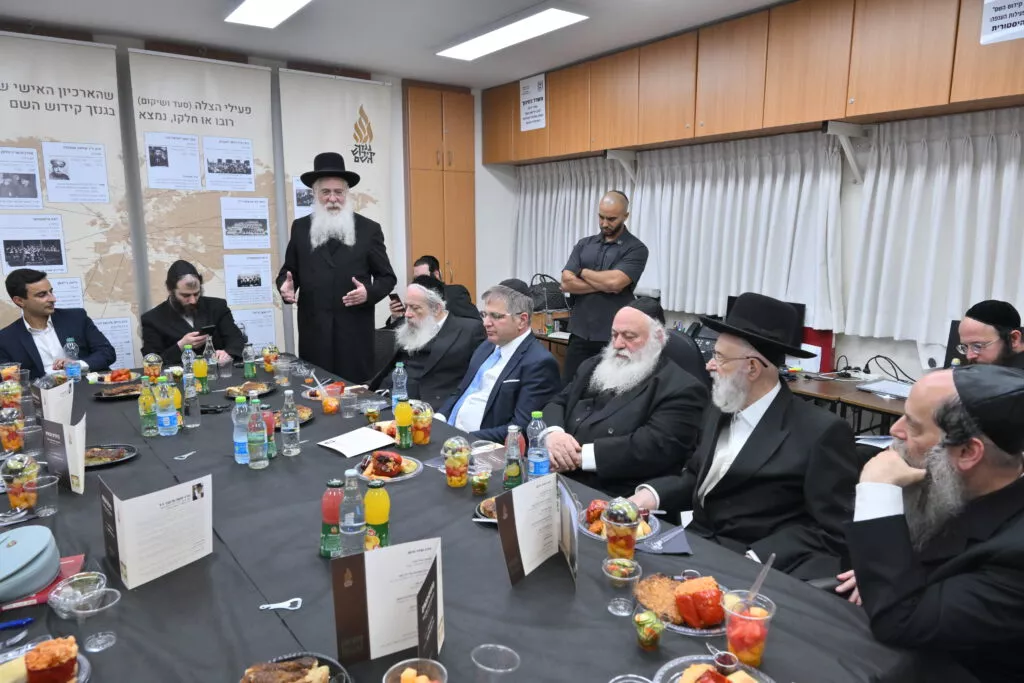
Rabbi Moshe Chaim Lau during his speech
The room was silent. All eyes were directed to the figure of Rabbi Lau, the revered rabbi, who fascinated his listeners as always. Every word on point, wonderfully crafted, found its way to hearts near and far.
Here is the story as he told it:
Glazman the Thug and the Torah
About 30 years ago, with the fall of communism and the Iron Curtain, it was possible, for the first time, for the Jews of Israel to visit the countries of the communist bloc.
My father, Rabbi Yisrael Meir Lau, as a native of Poland and a survivor of the Holocaust, decided to take advantage of the opportunity and take his immediate family on a trip to Poland. My uncle, Mr. Naftali Lavi, as well as a number of close friends, joined the trip. The journey that lasted 11 days was full of emotions, and included many moments of pain.
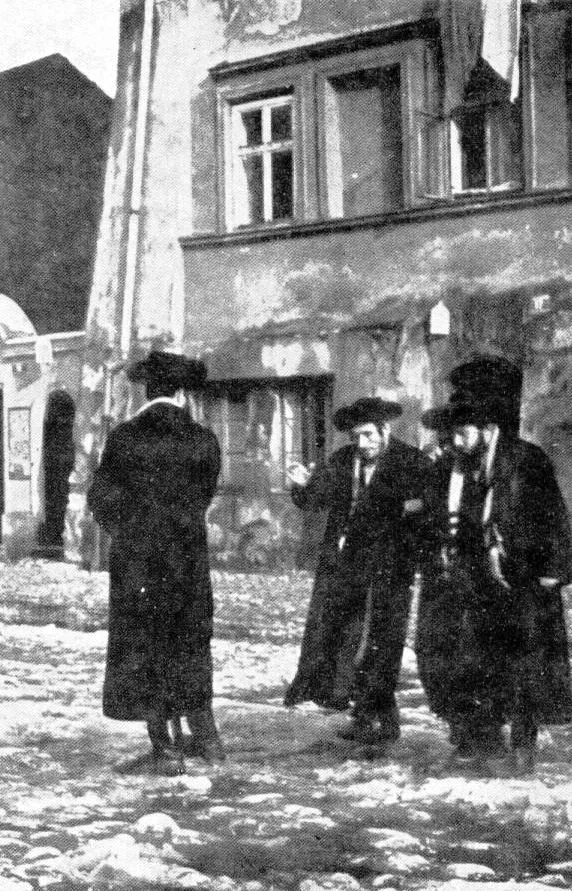
Chassidim in Krakow
In general, post-Iron Curtain Poland was a sad and depressing Eastern European country. Today, things are a little different. We decided to spend Shabbat in a hotel in Krakow, apparently near the home of my grandfather, Rabbi Simcha Frankel-Teomim, may G-d avenge his blood, the Skaviner Rebbe, grandson of the Divrei Chaim Rabbi of Sanz, where my father stayed as a baby in the summer days before the war. The preparations for Shabbat were uplifting, and we dipped the cooking pots we bought in Krakow on Friday in the famous Vistula River, adjacent to the hotel (in order to purify them for kosher use).
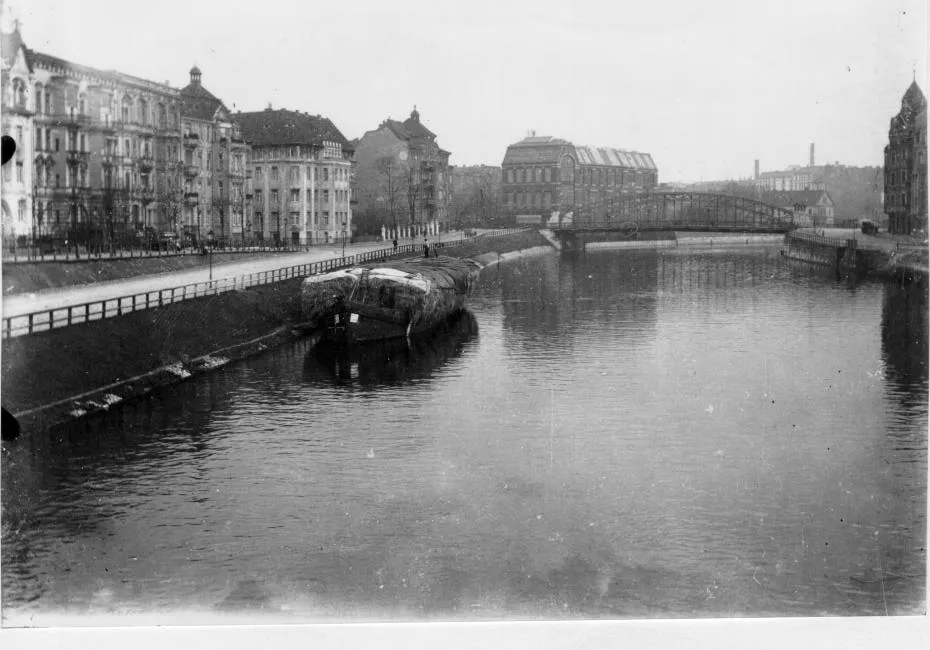
Homes in the city of Krakow on the banks of the Vistula River
On Shabbat morning, we prayed at the Rema synagogue, and between kiddush and the Shabbat meal, we had a break for an hour. I left the synagogue with several family members, and suddenly I saw a Jew on the streep waving hello to me. It was Moshe Teller, a resident of Tel Aviv, who happened to be in Krakow on the same Shabbat. As he was from Krakow, he knew every corner and recommended that we accompany him for the next few minutes. Every so often he stopped and pointed to a Polish apartment that had been a shtiebel (small synagogue), and then we arrived at a building that undoubtedly looked like a synagogue. It was the famous Isaac Yaakils synagogue.
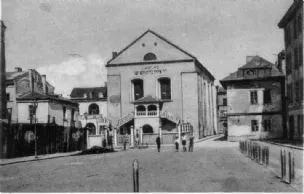
The Isaac Yaakils synagogue in Krakow, Poland
Every child knows the story about Isaac who dreamt of a treasure in Prague, and when he got there, he met a local policeman who told him that he had dreamt that in the yard of Isaac in Krakow, there was an oven and that underneath the oven lay a treasure. When Isaac arrived home and dug under the oven, he found the treasure. A story with many morals.
To our dismay, the synagogue was closed at the time and we stood on the sidewalk next to it. Suddenly we saw Moshe Teller turn pale, and someone ran to get him a glass of water. After he calmed down, he began to tell us what caused his emotion: The war broke out on the 17th of Elul 5769 (Sept. 1st, 1939). Poland was bombed by hundreds of German air force planes. Thousands were killed by the bombings, houses were destroyed and crowds fled outside the cities. On Rosh Hashana, there were impromptu minyanim (prayer quorums), but the large synagogues were closed due to the terror of the bombings. During the ten days of repentance (between Rosh Hashana and Yom Kippur), the bombings calmed down and the people began to return home. In our naivety, we thought that the worst was behind us, and that after the occupation the situation would calm down. We did not imagine that everything that had happened up to this moment was simply a prelude to the horrors that would be our lot in the years to come.
On the eve of Yom Kippur, I went to the shtiebel of the Radomsk chassidim where my father prayed. (Moshe pointed to an apartment on the second floor across from where the shtiebel stood). As I passed here on the sidewalk near Isaac’s synagogue, the doors opened, and two German soldiers wearing uniforms that I had never seen before came out to meet me and dragged me into the synagogue. To my astonishment, I discovered about a thousand men and women crammed into the synagogue, in a terribly dense manner, and I realized that everyone who was there had been dragged to the place like me. Every few minutes the door opened and more Jews were pushed into the room. The rumor began to circulate that the building was going to be set on fire and everyone in it was to be burned, and the anxiety was terrible.
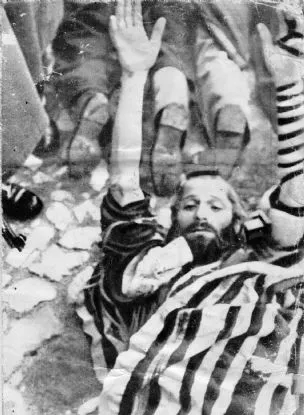
Nazis abusing a Jew wrapped in his prayer shawl and tefillin
Suddenly the door opened again, and instead of two Gestapo men, about ten of them appeared, bruised from a fight and dragging one Jew with them. It was Glazman, the thug of Krakow, a Jew who was feared by everyone, Jews and Poles alike. When people saw him walking down the street, they moved to the other side to avoid bumping into him. His Jewishness had no significance. He probably also was passing through the street, and when they tackled him, he surprised them with his blows, and only after a struggle were they able to overcome him. At this point, the officer ordered one of the elders of the community to open the Ark of the Covenant and take out a Torah scroll. The Jew did as he was ordered and brought the book to the bima (platform) where the Torah reading normally took place. We understood that they didn’t bring us to the “Kol Nidrei” prayer, but what followed was terrible. They ordered the old man to spread the scrolls of the book on the floor of the bima like a carpet. He resisted, but after receiving a very strong blow from a rifle butt, he realized that he had no choice, and so he did. And here comes the worst of it all. They dragged Glazman, stood him on the bookshelves and ordered him to defecate on the book. A compulsive feeling surrounded us all, but in my heart I said that someone like Glazman would be capable of this. But to everyone’s surprise we heard his resolute voice: No. They began beating him to death, and after a while they stopped beating him and demanded it from him again, and Glazman again refused. This story continued several times, and moment by moment his power weakened. For the last time he could no longer speak, but waved his fingers up in a firm sign of denial. This was seen from all corners of the synagogue due to the raised bima, and we all admired Glazman for his firm stand. Glazman, may G-d avenge his blood, breathed his last. The killers wrapped his body in the Torah’s parchment and took him out of the synagogue. After the shocking sight we saw, the Nazis released everyone.
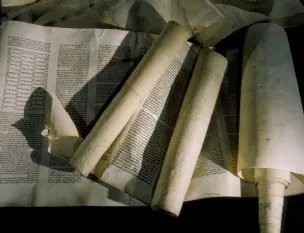
Parchments of a desecrated Torah scroll
After Moshe Teller finished telling the heroic story of Glazman, may G-d avenge his blood, I reflected a lot on the greatness of the sanctity of the Jewish soul. Before us was a man who could undoubtedly be defined as a “posheh Yisrael” (a Jew who does not care at all about the commandments), but when his faith was tested he was exalted with holy and pure virtues. His death somewhat reminded me of one of the The Ten Martyrs, Rabbi Chanina ben Teradion. The two of them – Glazman and the righteous man of the generation – were wrapped in Torah parchment when they were killed in sanctification of G-d’s Name. The power of a Jewish soul. However, I thought that the story was appropriate for previous generations – from the time of the Sages (Rabbi Elazar ben Doradia or Yosef Meshita), from the time of the Crusades or the martyrs in Spain – but here stood someone who saw such a thing before his very eyes; maybe in the storm of the years he was exaggerating a bit.
A few days after we returned to Israel, I went to pray in my father-in-law z”l’s synagogue in Bnei Brak. At the end of the prayer, one of the worshipers approached me, Rabbi Yosef Scheller, a Bobover chassid and a native of Krakow. “Your father-in-law told me that you were in Poland, were you in Krakow?” he asked. “Were you in the synagogue of Isaac Yaakils?” I told him that I was indeed next to it, but it was closed. Rabbi Yosel (Yosef) told me: “I must tell you a story from there.” When he finished, I was shocked; it was exactly what I had heard a few days before. I told him that I had indeed heard it there in Krakow from someone who was also present at the time. Rabbi Yossel told me: It is not possible, everyone who was present there did not survive the war. When I went out into the street, Rabbi Yossel called after me: “Maybe you met Moshe Teller there, a classmate of mine in cheder in Krakow, he also survived the war, maybe he was also there.” I told him that indeed it was Moshe Teller. Sages taught us that to determine the credibility of two witnesses, one is pressed and the other is questioned, and after he has finished, his friend is invited and questioned; if their testimony is found to match, they are accepted. That’s how I felt when Yossel Scheller finished telling what I had already heard from Moshe Teller.
12 years ago, on the day before Yom Kippur eve, I get a call from the “Sharet” high school in Netanya, a secular high school where the students complained to the management that Yom Kippur was coming and the school had not brought in a rabbi to speak about the holiness of the day. The students requested that I come to speak to them that day, because it was the last day of school before Yom Kippur. I was excited by the request, I left other important pursuits and came. Before the end of my sermon I told them Glazman’s story, and the students sat speechless. A few days later I received an emotional letter – which I have kept – from the student council at school because the story moved them so much that they all decided to go to the synagogue the next day for the “Kol Nidrei” prayer.












